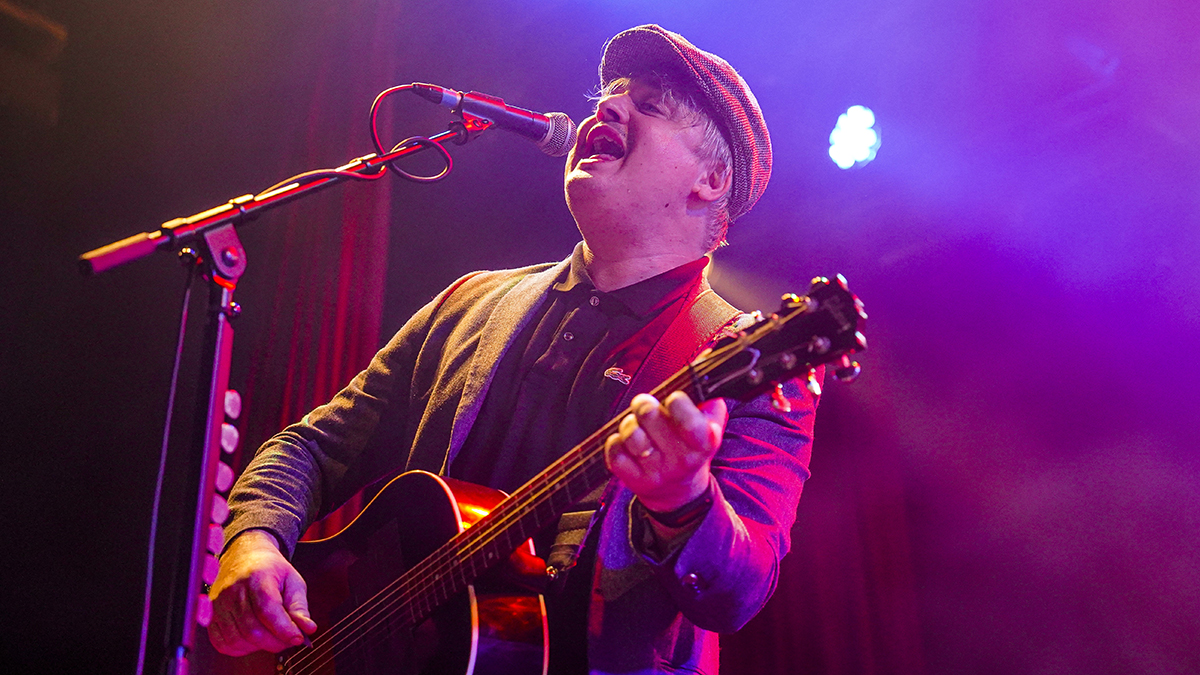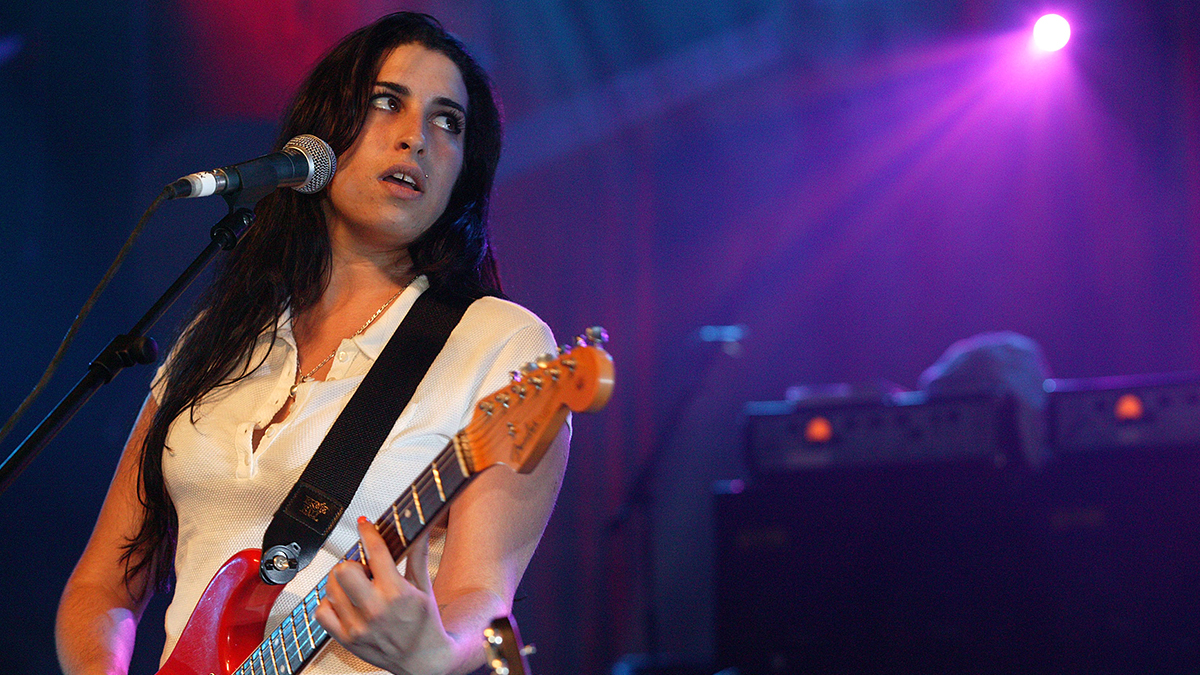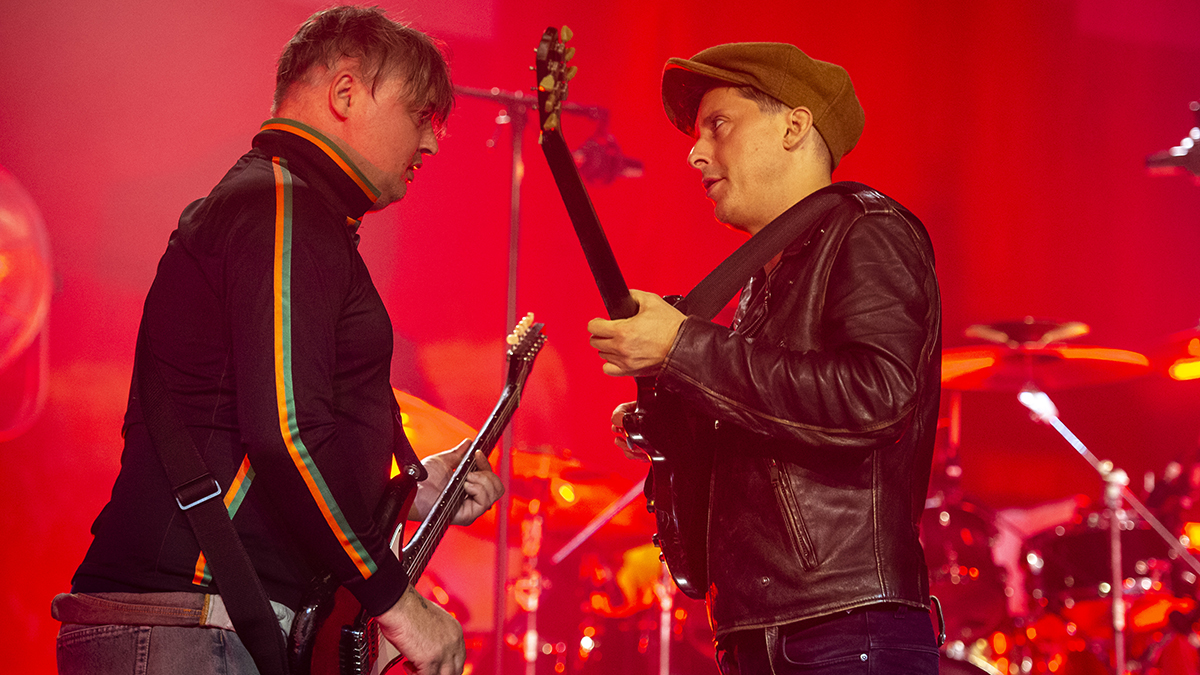"I’ve sat in a room with Amy Winehouse and a guitar. Watching those tiny hands finding all these weird jazz chords. And her strumming patterns... crazy, off-kilter timings. She made it look so effortless": Pete Doherty talks friendships, guitars and music
Plus, the 5 songs that changed his life

Pete Doherty is in Margate, the once thriving traditional British seaside resort that has become the Libertines’ de facto hometown. Doherty used to live here - bandmate, Carl Barat, still lives here - and it’s where the band recorded their recently released fourth album, All Quiet On The Eastern Esplanade.
“Carl persuaded the band to invest in a bit of Margate bricks and mortar,” explains Doherty. “The idea was to turn it into a B&B, local community space, bar, venue and recording studio. Having our own recording space is amazing, but let’s just say that I’m better at playing guitar than I am at running a B&B.”
Called The Albion Rooms, this imposing, terraced townhouse features on the front cover of the new album and its address is on... Eastern Esplanade. On a sunny April morning, the front door looks out onto a beautiful, albeit ‘choppy’, stretch of Walpole Bay - allegedly named because of a vague connection with Britain’s first Prime Minister, Sir Robert Walpole.
The zigzag of streets behind the seafront are home to various second-hand shops and vintage markets, which is where Doherty has spent the previous couple of hours, saying hello to old mates and picking up a few nick-nacks to add to his collection of old bank notes and chromatic harmonicas.
Will I watch it? Maybe. If it’s being shown on a long-haul flight.
Pete Doherty on Back to Black
While on his morning stroll, Doherty also saw an advert for the new Amy Winehouse film, Back to Black, which seems to have puzzled him.
“This isn’t the documentary that came out a few years back?” he wants to know. “This is a new thing? A biopic? With someone playing Amy?”
I nod, but he doesn’t look convinced.
Get the MusicRadar Newsletter
Want all the hottest music and gear news, reviews, deals, features and more, direct to your inbox? Sign up here.
“I’m not a censor and it doesn’t matter what I think, but it’ll be interesting to see if they can get someone who can replicate her talent as a guitar player without resorting to AI. Will I watch it? Maybe. If it’s being shown on a long-haul flight.”
Armed with a black coffee - containing FOUR espresso shots - he heads to the studio in the Albion’s back basement, relishing the chance to talk about music.
“People usually want to know about the other side of my life,’ he says with a shrug. “I get that. It was the same with Amy. All about the rumours and the headlines. They didn’t care about the music. Listen, I’ve actually sat in a room with her and a guitar. Watching those tiny hands finding all these weird jazz chords. And her strumming patterns... crazy, off-kilter timings. She made it look so effortless.”

As we sit down in the studio’s decent-sized live room, Doherty instinctively reaches for an acoustic guitar, brushing out gentle chords in between sips of coffee. I ask if he can remember the first time he ever picked up a guitar and his face cracks into a huge smile.
“I haven’t thought about that for years. I’ve got this memory of living in Lisburn in Northern Ireland. My dad was in the forces and he was stationed there. There was an acoustic guitar in the loft and, one day, I climbed in, asking my dad what it was. The only thing he could play was the bassline to a Beach Boys song - can’t remember which one - then he handed it to me. ‘Learn the guitar. Get yourself a band.’
“I banged around on it for a few weeks, but I had no idea what he meant. It was only years later, when a kid at school gave me a tape of the Stones Roses and the Smiths, that I understood what this guitar thing could do. I listened to that tape over and over. I wanted to create that power and that emotion. And I wanted to be in a band!
“Because of Dad’s job, I was used to that idea of someone putting on a uniform, picking up a weapon and going around the world. But then I realised you could put on a different kind of uniform... a Johnny Thunders uniform or a Beatles uniform. And instead of a gun, you could pick up a guitar. I enlisted immediately. Sign me up for life!
“The first gig with the Libertines was somewhere like the Hope & Anchor or the Dublin Castle in London. A tiny pub where you had to pay to play and bung the sound guy a fiver. About half a dozen people standing at the bar, completely uninterested. John and Carl had been in bands before, but this was something completely new for me. I’d found my gang, the place where I belonged. No joke, I got more fulfilment from that gig than I did playing Glastonbury or Reading.”
As you’d expect, the Albion Rooms studio is fairly old school. Plenty of real guitars, drum kits, Marshall/Vox/WEM amps, weird things to bang and strum, a Rhodes and what looks like a rickety old school hall piano.
“For a while, I was scared of the more classic rock guitars like the Fenders and the Gibson Les Paul,” he laughs, pointing at a cream Stratocaster in the corner. “They gave me the willies. I can appreciate them now, but I still feel they’re too heavy for me. I find it hard to leap around and throw all my moves with a big lump of wood hanging off my shoulder. That’s probably why I gravitated towards the Epiphone Coronet. It’s thinner... lighter. I’ve got a 1957 New York Coronet with the original pick-up. The sound is perfect, you don’t have to mess about with it. No pedals, just straight into a decent WEM valve amp.
“As part of the Libertines/Babyshambles/Puta Madres family, we’re very lucky to work with Andrew Newlove, who makes Newlove Guitars - he’s also a brilliant guitar tech. And there’s Gary Hodgkiss, who looks after our amps, as well as making his own gear. We’ve been looking at putting together our own range of guitars and amps with these guys. If there’s anybody out there who’s got the infrastructure and is willing to take a chance with us, please get in touch.
“The Coronet is my live guitar, but if I’m writing, I’ll generally grab an acoustic. We’ve got a couple of old Yamaha J-50s and J-45s. Just me, a comfy chair, the guitar, a carton of cigarettes and my notebook. When I’m writing, I keep the technology to a minimum.
“Having said that, we did write some of the songs on this new album here in the studio. The four of us, all plugged in, messing around with a few chords, taking it round and round, see where it goes. I Have A Friend and Be Young were both written like that.
“I’ll be honest, I was very nervous because we’d never done that before. We’ve always gone into the studio with a bunch of strong ideas that were half-finished... we knew where a song was headed.
“Ha! Talking about technology, you’ve just reminded me of something else. When I was deep into my addiction, wandering around in a mist, I used to tell people that neither me nor Carl used guitar pedals. When I got clean and the mist finally lifted, I noticed that Carl had a whole bunch of pedals behind his amp. It was like seeing the Wizard of Oz for the first time, peeping behind the curtain.
“Although I did try to fight against the technology for several years, it was always a losing battle. For instance, we’ve got an old reel-to-reel tape machine in the storeroom, but we can’t get the tapes. And even if you can find tapes, it’s hard to judge the quality until you start recording. We live in a digital world and this is a fully digital studio. I’m finally getting used to that.”

Since their arrival in the early-2000s, the Libertines’ story has had its fair share of ups and downs. Fall-outs, break-ups, reunions, tabloid headlines, drugs, rock ‘n’ roll, jail sentences, famous girlfriends and so on. But with a drug-free Doherty now married with a young child and the rest of the band enjoying family life, the Libertines dynamic seems far more settled.
“Yeah, there were times when I wasn’t sure I was going to make it out the other side. I’m not commenting on the hows and whys, I’m just stating facts. Right from the start, there was always an edge to everything we did as a band. It was uncomfortable at times, unpredictable, there was a lack of communication. A pirate vibe! But with the release of this album, things feel very different. We’re all that bit older, we’ve got kids, we’re tighter as friends, we talk more, we hang out more, we’re a family. For the first time in a long time, the Libertines feels like... fun!’
The Libertines new album, All Quiet On The Eastern Esplanade, is out now. Their UK tour starts on July 28.
Pete Doherty - 5 songs that changed my life
The Clash – Jail Guitar Doors (1978)
“We were lucky enough to work with Mick Jones from the Clash in the early days. It was around the time that him and Joe Strummer got on stage together for the Fire Brigade Union benefit gig at Acton Town Hall - the first time they shared a stage in years. Mick said they were planning to do a few more things, but then Joe passed away. Such a loss. One of the greatest bands of all time.”
Townes Van Zandt - Waiting Around To Die (1969)
“A perfect example of how a song can capture a certain mood... a certain narrative or way of life. That’s always been my intention. It’s just words and a guitar, but it says so much.”
The Kinks - Big Black Smoke (1966)
“And then you’ve got something like this, which takes that narrative idea as far as it can go. So many of Ray Davies’ songs come across like radio plays or six-part dramas. So much detail, so much humanity. The Kinks have always been a big influence.”
The Smiths - Jeane (1983)
“You’ve got this driving, almost punk feel at the start, which then descends into a strange psychedelic melody, followed by the most mournful voice in history, coming out of nowhere. I always imagine it as the scene from a bedsit and I’m listening to it through one of those old tin-can loudspeakers. And don’t forget Sandie Shaw’s version. What’s not to like!”
Bongo Man Byfield and The Skatalites - Marcus Garvey (1965)
“As a kid, I used to play this over and over, dancing around the record player for hours on end. I had never heard a sound like it... so joyous, so full of energy. All recorded in one room with one mic; this is us and this is the noise we make. I like that approach.”
“Every note counts and fits perfectly”: Kirk Hammett names his best Metallica solo – and no, it’s not One or Master Of Puppets
“I can write anything... Just tell me what you want. You want death metal in C? Okay, here it is. A little country and western? Reggae, blues, whatever”: Yngwie Malmsteen on classical epiphanies, modern art and why he embraces the cliff edge









